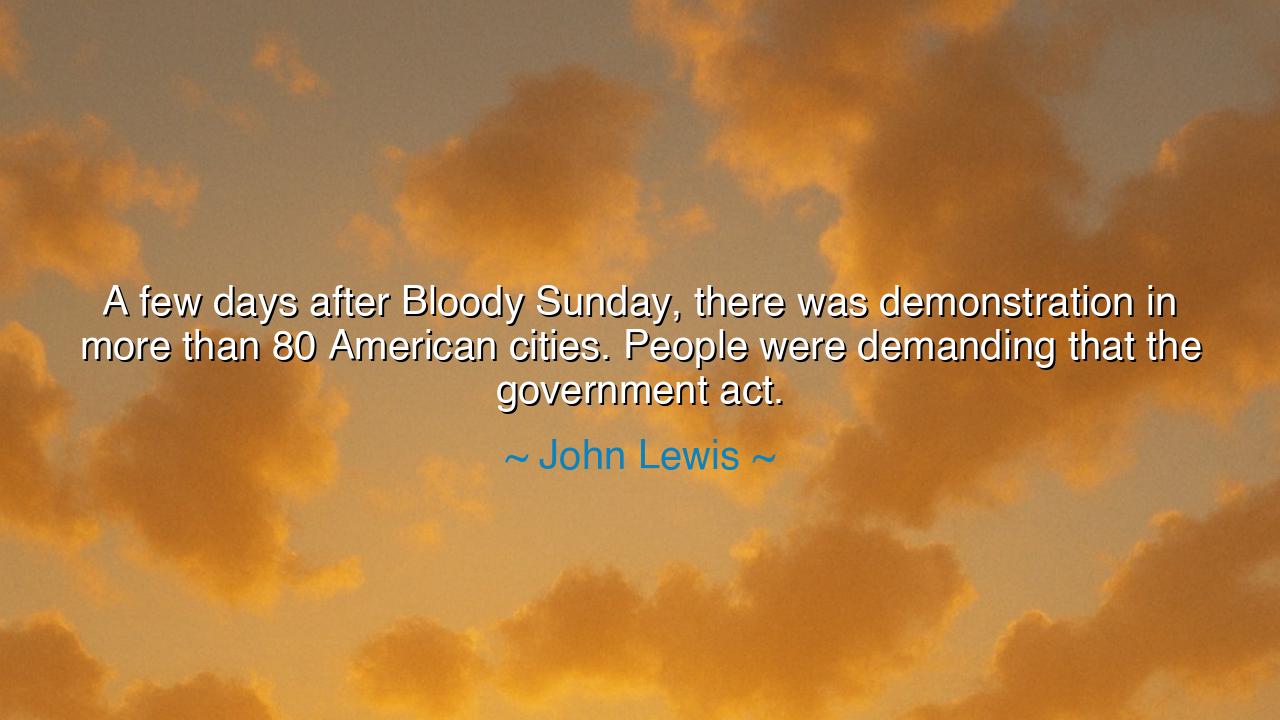
A few days after Bloody Sunday, there was demonstration in more
A few days after Bloody Sunday, there was demonstration in more than 80 American cities. People were demanding that the government act.






The words of John Lewis — “A few days after Bloody Sunday, there was demonstration in more than 80 American cities. People were demanding that the government act.” — ring like a trumpet from the pages of history. They remind us that when injustice bleeds upon the earth, it does not remain confined to one place; it awakens the hearts of the righteous everywhere. In these simple yet profound words, Lewis speaks not merely of protest, but of moral awakening — the moment when a nation’s conscience, long silent, rises in one voice to demand justice. His words carry the weight of blood and courage, of men and women who faced clubs and bullets so that future generations might stand in freedom.
The origin of this quote lies in the aftermath of Bloody Sunday, March 7, 1965 — the day the world watched the American promise of liberty clash with the cruelty of oppression. On that day, six hundred peaceful marchers set out from Selma, Alabama, intending to walk to Montgomery to demand the right to vote. They were led by John Lewis, then a young man of twenty-five, and by the fearless Hosea Williams. But as they crossed the Edmund Pettus Bridge, they met a wall of state troopers who beat them mercilessly with clubs, whips, and tear gas. The nation saw their suffering on television — the broken skulls, the cries for mercy, the blood on the pavement — and something in the American soul began to stir.
When Lewis speaks of demonstrations in “more than 80 American cities,” he recalls how this one moment of horror ignited a national moral fire. People of every color and creed — black and white, rich and poor, young and old — rose up in unity. Churches, universities, and citizens’ groups across the land gathered in prayer, protest, and solidarity. They were not asking politely; they were demanding that the government act — that the United States live up to its own creed that “all men are created equal.” This was not the cry of rebellion, but of responsibility — the awakening of a people who realized that to remain silent in the face of injustice is itself a sin.
In the ancient style of moral struggle, suffering became the catalyst of transformation. Just as the martyrdom of the early saints strengthened faith in the face of persecution, so too did the blood spilled in Selma awaken a nation’s conscience. Within days, President Lyndon B. Johnson addressed the nation, echoing the words of the movement — “We shall overcome.” Soon after, the Voting Rights Act of 1965 was introduced and passed, marking one of the most powerful triumphs of nonviolent resistance in history. It was proof of what John Lewis long believed: that righteous suffering has redemptive power, and that when ordinary people act together with courage, even the most immovable institutions must bend toward justice.
Lewis’s words, though born of a specific time, speak to all ages. They remind us that change is never granted — it is demanded. Governments move slowly, often resisting what is right until the people make it impossible for them to do otherwise. “People were demanding that the government act,” he said — not pleading, not waiting, but demanding. This is the duty of a free citizenry: to hold power accountable, to confront injustice wherever it hides, and to ensure that the promises of democracy are not hollow words but living truths.
The lesson, then, is eternal: injustice anywhere must awaken action everywhere. One city’s pain must become every city’s cry. One person’s suffering must stir the hearts of all who live in comfort. The courage of those who marched in Selma teaches us that freedom is not maintained by the strong alone, but by the steadfast — those who keep marching even when the road is hard, who keep speaking even when their voices tremble. The moral arc of history bends toward justice only when hands, hearts, and voices together pull it that way.
So let this teaching pass to all who listen: never wait for the powerful to awaken — awaken them. Be as those 80 cities were — united in conscience, relentless in purpose. When you see wrong, do not avert your eyes. When you hear silence in the face of cruelty, become the voice that breaks it. For the blood shed on the bridge at Selma cries out still — not for vengeance, but for vigilance.
And thus, remember the enduring wisdom of John Lewis’s words: the conscience of a nation is measured by its response to injustice. Governments act only when their people demand that they do. The march toward justice never ends — it is renewed in every generation. So rise, as those before you rose. March, as they marched. Speak, as they spoke. For liberty is not a gift bestowed — it is a dream defended, again and again, by those who refuse to surrender.






AAdministratorAdministrator
Welcome, honored guests. Please leave a comment, we will respond soon